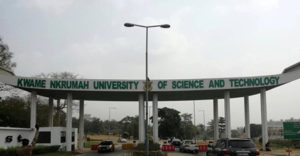KNUST trains biomedical scientists to develop COVID-19 test kits
 The Department of Molecular Medicine at the Kwame Nkrumah University of Science and Technology (KNUST) and the Kumasi Hive Biolab, have begun training 40 biomedical scientists to develop covid-19 test kits locally.
The Department of Molecular Medicine at the Kwame Nkrumah University of Science and Technology (KNUST) and the Kumasi Hive Biolab, have begun training 40 biomedical scientists to develop covid-19 test kits locally.
The project is expected to help make COVID-19 test kits affordable and accessible in all parts of the country and reduce the turnaround time for test results when fully developed and approved by Food and Drugs Authority (FDA).
It is being done under a 500,000-euro project partly funded by the develoPPP programme and implemented on behalf of the German Federal Ministry for Economic Cooperation and Development (BMZ).
The development of a lab to produce tests kits is also supported by UnternehmerTUM, a German company and Deutsche Gesellschaft fur Internationale Zusammenarbeit (GIZ) GmbH.
Presently, the World Health Organisations (WHO) recommended technique for testing for COVID-19 is the reverse transcriptase quantitative polymerase chain reaction (qPCR) testing.
This type of test requires in-depth technical knowledge. It is time-consuming and requires specialised realtime machines. It it is also expensive due to the reagents or chemical components used.
The project, which started in February last year, seeks to develop affordable and effective covid-19 test kits locally.
A Senior Lecturer at the Department of Molecular Medicine and lead scientist of the project, Dr Samuel Asamoah Sakyi, said the “RT-Lamp assay employs colorimetric output – a color change from red (negative) to green (positive). It is easy to do, inexpensive, and turnaround time is fast, this is the advantage the RT-Lamp assay has over the WHO recommended qPCR method of testing for SARS-cov-2.”
He said the project was not only developing local COVID-19 test kits, but also training 100 biomedical scientists to equip them with knowledge and skill needed to run the tests.
Dr Sakyi said so far, 40 Ghanaian biomedical scientists had been trained in the testing procedure, which included nasopharyngeal sample collection and extraction of RNA.
He said the project would allow anyone to go through a simple procedure that could give results comparable to that of any of the known testing centres irrespective of where people may find themselves.
The medical doctor added that the trainees, most of whom had never extracted RNA or DNA, would be well equipped to do so.
He said the project would reduce the burden on the few existing testing centres like the Kumasi Centre for Collaborative Research in Tropical Medicine (KCCR) and Noguchi Memorial Institute for Medical Research (NMIMR) and ensure that biomedical scientists qualified to extract samples and test properly for accurate results.
Source: GNA
